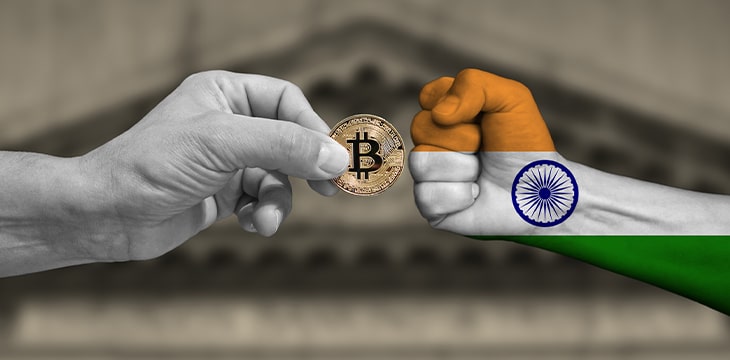|
Getting your Trinity Audio player ready...
|
The value of digital currencies has recently fallen by approximately 60% in India due to a sell-off and price movements, resulting in a steep decline of about 80-90% average drop in trading volumes on top digital currency exchanges in April. A total of 20 million residents of India held digital currencies worth $5.3B until February 2022.
On April 7, Coinbase launched its full-service trading operations in the country. Hours later, the National Payments Council of India (NPCI), denied any digital currency exchange using their Unified Payments Interface (UPI) system. Next, Coinbase suspended UPI, followed by MobiKwik, CoinSwitch Kuber, CoinDCX, and WazirX also blocking deposits via UPI.
These statistics offer a glimpse into the aftermath of the Indian government announcing the digital currency regulations, which include a 30% tax on all digital currency gains, a 1% TDS (tax deducted at source) on digital currency investments worth over INR 10,000 ($131), no offsetting of digital currency losses against profits made, with effect from April 1. Residents of India, particularly investors and traders, have since responded with a wide range of emotions—from relief to worry to anger and a state of confusion and uncertainty.
“People were primarily relieved because they probably felt good thinking the government didn’t outrightly ban digital currencies, but the reality is now sinking in for traders because the declared tax percentage on all virtual digital assets (VDA) is quite stringent. The Indian government will do everything in its capacity to tame the free trading of VDAs in India,” BlockReview Founder Kumaraguru Ramanujam told CoinGeek.
Is Coinbase welcome in India?
Coinbase (NASDAQ: COIN) launched its trading operations on April 7, as announced by CEO Brian Armstrong at a maiden event in India, where he mentioned that Coinbase has invested $150M in Indian startups and will hire 1,000 people in 2022. A major investor in two leading digital currency exchanges in India, CoinSwitch Kuber and CoinDCX. Coinbase allegedly began testing UPI payments in March 2022.
However, NPCI claimed a few hours after the launch that it was “not aware” of any digital currency exchange using the UPI system. Things went south for Coinbase as the exchange later announced that it has disabled buying digital currencies via UPI. It also halted rupee transfers to its trading app via UPI within three days.
Mobikwik, a digital wallet, followed suit by also stopping UPI payments. And then CoinSwitch Kuber, CoinDCX, and WazirX. Almost seven digital currency exchanges halted trading one after another in the country, causing a state of concern and desperation among digital currency enthusiasts.
“Indian government won’t let these high-risk businesses operate as they like; and rightfully so. The reckless practice of digital currency trading is a sureshot way of encouraging money laundering in India and the government will take all steps possible to curb that,” Kapil Jain of BSV Blockchain Association stated.
RBI vs. Government
The Reserve Bank of India (RBI) has freely expressed its aversion toward digital currencies on more than one occasion. Since digital currencies are created by people who buy them and are completely outside the gamut of the Indian financial system, no voluntary authority will immediately like or support them. Authorities at the RBI have expressed disapproval of anything “crypto,” adding that they will be happy if it is banned. The Indian government, on the other hand, is unwilling to officially ban it, or at least openly, perhaps because of the Supreme Court judgment in March 2020, which had set aside RBI’s previous plan to ban digital currencies in India.
When asked if the government is being overly conservative, Jain responded: “This was ought to happen. The government is still evaluating the facts and risks associated with digital currencies, and it will eventually either become more receptive or closed to this whole concept, particularly blockchain technology.”
“I am hoping the government can distinguish between currencies like BTC, ETH, etc., that are entirely driven by speculation, and Bitcoin SV which is rooted in scalable enterprise blockchain technology based on the original Bitcoin protocol,” he added.
A trader’s tale
Trading is a game of speculation, but is the Indian government coming on too strong towards its people? Investors and traders are bearing the brunt as they transfer their digital currencies to overseas wallets. They are opening accounts with platforms abroad, and for those who can’t, their money is locked, and they don’t know when they can sell their digital currencies and at what price, nor do they know when to withdraw their money. There has been an 80-90% average drop in trading volumes on top digital currency exchanges in April compared to a few months ago.
According to a financial advisor in India who asked to remain anonymous, investors who were investing a lot of money into digital currencies have now taken a step back.
“Many of them have made profits and they are sitting on those until more clarity appears. Some large investors have started moving to Dubai and Singapore where regulations are better than India, especially regarding taxation,” the financial advisor told CoinGeek.
Is this brain drain? The scenario certainly appears to be so and a not-so-unfamiliar concept for India. The government indeed needs to evaluate the risks of digital currencies and safeguard its nation, but it is also crucial for it to be regulated. The difficult stance of RBI, in addition to an exorbitant tax rate on digital currency gains in India, is inevitably discouraging traders from moving forward within the country. Banks, too, have joined the league, and people are allegedly unable to use their money (sitting in their bank accounts) to buy digital currencies.
“Crypto is dying a slow death in India,” the financial advisor added.
Watch: CoinGeek New York presentation, Increasing Footprints of BSV Blockchain in Middle East & South Asia

 02-17-2026
02-17-2026 




